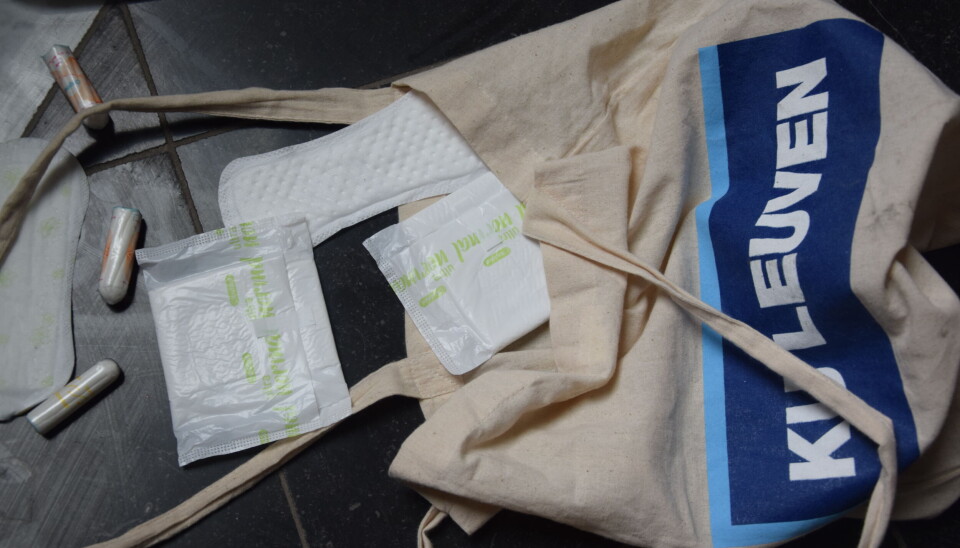ANALYSIS MENSTRUAL PRODUCTS
More and more free menstrual hygiene products at Leuven campuses

KU Leuven campuses in Brussels and Antwerp already offer free menstrual hygiene products. Now, the practice seems to be expanding in Leuven as well. Menstrual products were already being offered by local Stuvos, but now several faculties are also joining in on the initiative.
Research from Caritas Flanders shows that five percent of young women occasionally miss school because they cannot afford menstrual hygiene products. Two years ago, the Student Council (Stura) advocated for the provision of free menstrual products in every sanitary space across KU Leuven. Unfortunately, that aim does not seem to be accomplished yet.
'We want to reduce period poverty stress among students', says Marte Polspoel, the Student Council representative who is following up on the case. 'Furthermore, the supply of free menstrual products is also useful for students who forget their menstrual products at home or their student accommodation.'
General policy
Where do we stand at the moment? While some campuses offer free menstrual products, there is still no general policy in place at KU Leuven. 'Faculties can go ahead and take initiative themselves, they are free to manage the project as they see fit', says Nena Testelmans, KU Leuven's spokesperson.
'We want free menstrual products in all toilets: male, female and gender neutral', says Polspoel. Similar measures were already in effect at KU Leuven campuses in Brussels, with a test project initiated at the Antwerp campus as well. 'Of course, it would be a step in the right direction to test a few locations in Leuven first', she adds.
'Universities must have the courage to undertake this project as it is a major expense'
Lien Van Cant, staff member for diversity at UAntwerpen
The Faculty of Arts already offers free menstrual products. 'There is not as much passage in our faculty buildings as compared to bigger buildings with educational facilities, such as MSI or PDS', explains Matthias Meirlaen, administrative director of the Faculty of Arts. 'I think that we would reach more students if we also offered hygiene products at those places.'
How much does it cost?
'It is cheaper to acquire all period products at once, but logistically it makes more sense for the faculty or department to buy them themselves', says Pepijn Nollet, former Stura chairperson. One of the initiative's biggest obstacles is financing. 'In theory, money for sanitary products is already included in scholarships, but that sum only amounts to approximately one euro per month', he adds.
'Universities must have the courage to undertake this project as it is a major expense', says Lien Van Cant, staff member for diversity at UAntwerpen. The University of Antwerpen already offers free menstrual products in all of its restroom facilities. 'During our test project, we distributed a questionnaire for students to fill out ', she adds. These results justified the costs of the initiative.
91% of students at UAntwerpen only use menstrual products when they forget their own at home and 5% use them because of financial issues. According to Polspoel, the average cost of the project at KU Leuven campuses in Brussels lies well within predetermined budgets.
Period poverty
'Offering menstrual products directly in restrooms is the best approach', says Polspoel. According to her, the barrier is too high for students to ask for the products themselves. 'The taboo surrounding period poverty is far from over', emphasises Vermant. 'That is why we offer small, anonymous bags at discreet locations.'
Stuvo offers boxes with non-descriptive bags containing menstrual products at four different locations. 'The goal of our project is not to combat period poverty, but to lower the financial barrier during students' period of study', states Karen Vermant, staff member at Stuvo.
'One of our main concerns was that students would misuse the free products, but we do not notice that at all'
Matthias Meirlaen, administrative director of the Faculty of Arts
Stuvo's one-year test project is a cooperation with BruZelle, a Belgian organisation dedicated to combating period poverty. 'Additionally, the tampons are accompanied by information about toxic shock syndrome (TSS), as menstrual poverty concerns three pillars, one of them being knowledge deficit', emphasises Vermant.
'One of our main concerns was the possibility of students outside of the target audience using the free products, which would lead to a rapid depletion of supplies, but we did not observe such a thing at all', says Meirlaen. That is also not the case at UAntwerpen: 'Students prefer to use their products rather than those provided by the university, so those who don't need to, don't use them', adds Van Cant.









